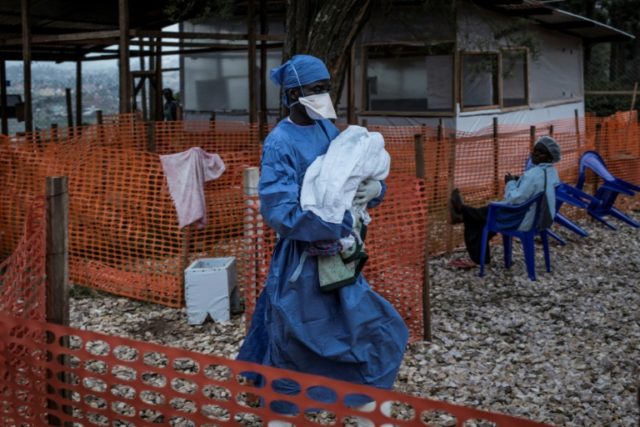The Ebola epidemic in the Democratic Republic of the Congo (DRC) continues to get worse, with the latest government figures showing the number of confirmed and probable cases surging past 2,000 since last August. Fatalities in the amount of 1,348 have been recorded.
The good news reported by Deutsche Welle on Tuesday is that the outbreak has not spread to densely-populated adjacent areas, and the latest experimental Ebola vaccine appears to be working. According to the report:
The world’s second-largest Ebola outbreak began in North Kivu province and then spread into Ituri province, although it has not yet spread to neighboring Rwanda and Uganda.
Response efforts have been hampered by distrustful communities and a plethora of armed groups regularly threatening and attacking health workers and treatment centers.
Without access to communities, health workers struggle to vaccinate those at risk, treat those infected, or trace contacts to halt the spread of the highly contagious hemorrhagic fever.
“As violence and insecurity continue to hamper daily operations and mistrust prevents people from seeking care, these numbers are likely an underestimate and not a realistic picture of the number of cases out there,” the International Rescue Committee warned.
Researchers say the rate of new Ebola cases has been accelerating as the security situation in the outbreak area deteriorates. According to some estimates, the number of new cases per week has tripled or quadrupled as responders are forced to suspend activities in the most unstable areas.
The United Nations is attempting to determine which of the many violent factions in the DRC is attacking Ebola responders. In an interview with NPR published on Tuesday, U.N. Emergency Ebola Coordinator David Gressly criticized the DRC government for politicizing Ebola, creating a “perception that the Ebola outbreak was manufactured” to shut down voting in cities that supported opposition candidates.
Foreign aid groups report lingering feelings of anger and distrust for the government among Congolese who feel Ebola was used as an excuse to suppress their votes. Locals have spread conspiracies through social media, radio, and pamphlets that either Ebola is a hoax concocted by the DRC government to control the population and scam foreign aid money, or that Ebola is real and the government and foreign aid workers are deliberately spreading it as a biological weapon to kill off the rural population.
Gressly explained that both paranoid local militia groups and foreign guerrilla forces left over from the regional wars of the past three decades patrol the restless eastern portion of the DRC. All of these factions are willing to manipulate civilians with propaganda and murder them when necessary.
This ugly stew of political propaganda and factional violence has resulted in attacks on Ebola responders by both confused, terrorized tribesmen and well-armed militia forces. Gressly told NPR he believed some local politicians may be using militia groups as mercenaries to disrupt Ebola treatment to pursue their agendas, while criminal gangs are also using violence to protect illicit harvesting of timber and minerals or frighten the locals into paying for protection. He also mentioned the possibility that “traditional healers” resent well-funded foreign medical teams moving onto their turf and “stealing” their clients.
The outbreak zone got the very last thing it needed on Wednesday when the Islamic State claimed responsibility for an attack on the Ebola-struck city of Beni that killed and wounded at least 25 people. Local authorities believe the attack was perpetrated by an ISIS-allied insurgent group from Uganda called the Allied Democratic Forces (ADF).
NPR quoted criticism that the United Nations is reluctant to hit back too hard against politically-connected militia groups for fear of damaging its relationship with the DRC government and making it even harder to get doctors and medicine into the outbreak zone. Greesly promised that one of his goals is to end political “impunity” for attacks on health care workers.
The BBC quoted aid workers who say they meet people in the Congo every day who doubt that Ebola exists. This level of mistrust is making it difficult for the World Health Organization (WHO) to monitor the spread of the disease. WHO currently believes it is “very likely” Ebola will spread from the DRC into neighboring countries.
“We are now seeing eight to 20 cases recorded each day, a number that is very likely an underestimate. Just a few months ago, we were only seeing three to five cases a day,” warned emergency response coordinator Tariq Riebl of the International Rescue Committee.
“To see such a spike in cases at this stage in the outbreak means a drastic change is required. This response requires a total and complete reset,” he said.

COMMENTS
Please let us know if you're having issues with commenting.